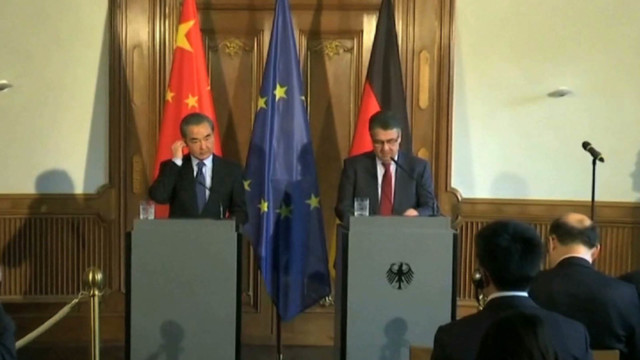The Korean Peninsula dominated discussions between top diplomats from China and Germany.
China’s Foreign Minister Wang Yi met his counterpart Sigmar Gabriel in Berlin, which was part of the “Strategic Foreign and Security Policy Dialogue” between Berlin and Beijing.
CGTN’s Guy Henderson reports.

As the threat of war looms, China still sees a path back from the brink.
“The most pressing issue right now is to take up negotiations again. All conflict parties have to work on that,” Wang Yi said.
At a meeting in Berlin, the Chinese foreign minister said Beijing would do all it could.
“Of course China is against DPRK developing nuclear weapons and we too think that it’s not in DPRK’s interest. But North Korea always claims that the development of nuclear weapons is in response to an American military threat,” Wang Yi said.
A threat that appears unpopular on both sides of Korea’s demilitarized zone.
South Koreans protested the U.S. THAAD missile defense system, expected to be operational in days.
It’s another reason why China sees the Korean conflict as one mainly between Pyongyang and Washington.
“That’s why it’s really up to the two directly involved conflict parties, the United States and DPRK, who must conduct talks together. China is a responsible country and also DPRK’s biggest neighbor which is why China will certainly make its contribution and take on an intermediary role,” Wang Yi said.
Easing trade tensions was also high on the agenda in Berlin, as it was a week before in Beijing, during a visit by the EU’s foreign policy chief.
At a time of so many global uncertainties, an effort appears to be underway to patch up significant differences.
Both sides spoke of an “open and friendly” meeting.
“We do not expect that China will become an open economy just like the German economy from one day to another. However, we agree that this opening must happen step by step and that we need an equal partnership with the same conditions for Chinese companies in Germany and Europe and for German companies in China,” Sigmar Gabriel, Germany’s Foreign Minister, said.
Wang Yi called the issue a “hindrance” for ties that appear to be broadening.
 CGTN America
CGTN America
